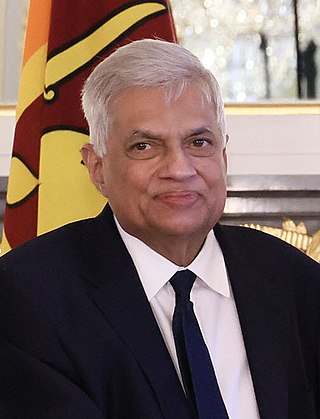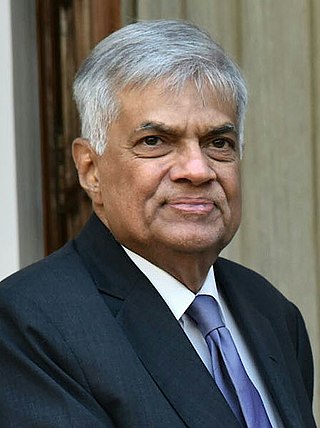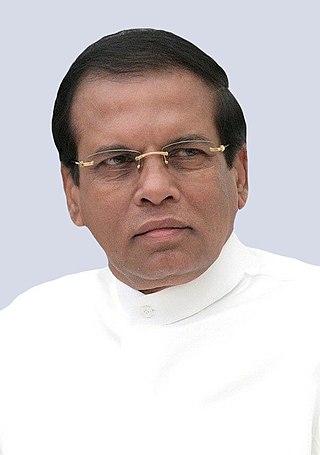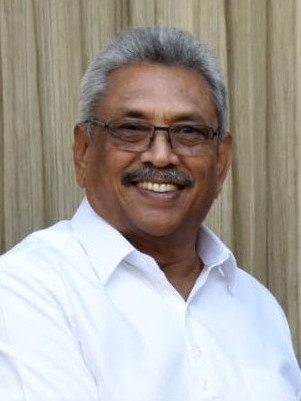Related Research Articles
Sri Lanka is a semi-presidential representative democratic republic, whereby the President of Sri Lanka is both head of state and head of government, and it relies on a multi-party system. Executive power is exercised by the President on the advice of the Prime Minister and the Cabinet of Ministers. Legislative power is vested in the Parliament. For decades, the party system was dominated by the socialist Sri Lanka Freedom Party and the conservative United National Party. The Judiciary is independent of the executive and the legislature.

Ranil Wickremesinghe is a Sri Lankan politician who is the 9th and current president of Sri Lanka. He also holds several ministerial positions, including the Minister of Finance, Minister of Defence, Minister of Technology and Minister of Women, Child Affairs and Social Empowerment.

The United National Party, often abbreviated as UNP, is a centre-right political party in Sri Lanka. The UNP has served as the country's ruling party, or as part of its governing coalition, for 38 of the country's 74 years of independence, including the periods 1947–1956, 1965–1970, 1977–1994, 2001–2004 and 2015–2019. The party also controlled the executive presidency from its formation in 1978 until 1994.

Mahinda Rajapaksa is a Sri Lankan politician. He served as the President of Sri Lanka from 2005 to 2015; the Prime Minister of Sri Lanka from 2004 to 2005, 2018, and 2019 to 2022; the Leader of the Opposition from 2002 to 2004 and 2018 to 2019, and the Minister of Finance from 2005 to 2015 and 2019 to 2021. He has been a Member of Parliament (MP) for Kurunegala since 2015.

Dinesh Chandra Rupasinghe Gunawardena is a Sri Lankan politician serving as the Prime Minister of Sri Lanka since 22 July 2022. He also holds the positions of Minister of Public Administration, Home Affairs, Provincial Councils and Local Government. Gunawardena has been leader of the left-wing Mahajana Eksath Peramuna (MEP) party since 1983, and has taken cabinet positions under several previous governments, including Leader of the House from 2020 until 2022.

Lieutenant Colonel Nandasena Gotabaya Rajapaksa is a former Sri Lankan military officer and politician, who served as the eighth President of Sri Lanka from 18 November 2019 until his resignation on 14 July 2022. He previously served as Secretary to the Ministry of Defence and Urban Development from 2005 to 2015 under the administration of his elder brother former President Mahinda Rajapaksa, during the final phase of the Sri Lankan Civil War.

The Minister of Finance is an appointment in the Cabinet of Sri Lanka. The post was created in 1947 when Ceylon gained independence as Sri Lanka.

The Prime Minister of the Democratic Socialist Republic of Sri Lanka is the head and most senior member of parliament in the cabinet of ministers. It is the second-most powerful position in Sri Lanka's executive branch behind the president, who is the constitutional chief executive. The Cabinet is collectively held accountable to parliament for their policies and actions.
The 15th Parliament of Sri Lanka was the meeting of the Parliament of Sri Lanka with its membership determined by the results of the 2015 parliamentary election, held on 17 August 2015. The parliament met for the first time on 1 September 2015 and was dissolved on 3 March 2020. According to the Constitution of Sri Lanka, the maximum legislative term of the parliament is 5 years from the first meeting.

The Sri Lanka People's Front, commonly known by its Sinhalese name Sri Lanka Podujana Peramuna (SLPP), is a political party in Sri Lanka. Previously a minor political party known as the Sri Lanka National Front (SLNF) and Our Sri Lanka Freedom Front (OSLFF), it was relaunched in 2016 as the SLPP and became the home for members of the United People's Freedom Alliance loyal to its former leader Mahinda Rajapaksa.

A constitutional crisis began in Sri Lanka when President Maithripala Sirisena appointed former president and member of parliament Mahinda Rajapaksa as Prime Minister on 26 October 2018 before formally dismissing the incumbent Ranil Wickremesinghe, resulting in two concurrent Prime Ministers. Wickremesinghe and the United National Party (UNP) viewed the appointment as illegal, and he refused to resign.

Presidential elections were held in Sri Lanka on 16 November 2019. The incumbent President Maithripala Sirisena's term of office would have ended on 9 January 2020. This was the first presidential election in Sri Lanka where no sitting president, prime minister or opposition leader ran for president. Gotabaya Rajapaksa won the election in a landslide victory, defeating his main opponent Sajith Premadasa.

The 16th Parliament of Sri Lanka is the current Parliament of Sri Lanka, with the membership determined by the results of the 2020 parliamentary election held on 5 August 2020. According to the Constitution of Sri Lanka the maximum legislative term of the parliament is 5 years from the first meeting.
The following lists notable events that took place during the year 2022 in Sri Lanka.

An indirect presidential election was held in the Parliament of Sri Lanka on 20 July 2022 following the resignation of former president Gotabaya Rajapaksa on 14 July. The president of Sri Lanka was elected by the Parliament of Sri Lanka in a secret ballot to decide who would complete the remainder of Gotabaya Rajapaksa's term. Candidates were nominated in the Parliament on 19 July in advance of the election the following day.

The 2022 Sri Lankan political crisis was a political crisis in Sri Lanka due to the power struggle between President Gotabaya Rajapaksa and the people of Sri Lanka. It was fueled by the anti-government protests and demonstrations by the public due to the economic crisis in the country. The anti-government sentiment across various parts of Sri Lanka has triggered a state of political instability that is unprecedented in the nation's history.

The fourth Gotabaya Rajapaksa cabinet, also known as the Rajapaksa-Wickremesinghe cabinet, was the central government of Sri Lanka led by President Gotabaya Rajapaksa. It was formed in May 2022 following the appointment of Ranil Wickremesinghe as the new Prime Minister and ended in July 2022 following Rajapaksa's resignation.
Presidential elections are scheduled to be held in Sri Lanka in September 2024, according to the constitution. Incumbent president Ranil Wickremesinghe is eligible to run for a second term, however Wickremesinghe has yet to declare his intention to run.

Gotabaya Rajapaksa, a Sri Lankan politician and former military officer who served as the 8th president of Sri Lanka from 2019 to 2022, initiated a self-imposed exile on 13 July 2022, following widespread protests led by civilians demanding his resignation, triggered by extensive discontent over his handling of the country's economic crisis.
References
- ↑ Jenkins, Amanda (February 5, 2019). "Copyright Breakdown: The Music Modernization Act | Now See Hear!". blogs.loc.gov. Retrieved January 2, 2020.
- ↑ "World's largest free trade deal is under way, but what is RCEP?". South China Morning Post. 2022-01-01. Retrieved 2022-01-01.
- ↑ Shum, Michael (30 December 2021). "Lawmakers prepare for oaths as Leung tipped to keep top post". The Standard . Retrieved 30 December 2021.
- ↑ David E. Sanger, U.S. Says Russia Sent Saboteurs Into Ukraine to Create Pretext for Invasion Archived 22 January 2022 at the Wayback Machine , New York Times (14 January 2022).
- ↑ Paul Sonne, Missy Ryan and John Hudson, Russia planning potential sabotage operations in Ukraine, U.S. says Archived 14 January 2022 at the Wayback Machine , Washington Post (14 January 2022).
- 1 2 "Russia denies looking for pretext to invade Ukraine". Associated Press. 17 January 2022. Archived from the original on 22 January 2022. Retrieved 22 January 2022.
- ↑ Michael Schwirtz & David E. Sanger, Russia Thins Out Its Embassy in Ukraine, a Possible Clue to Putin’s Next Move Archived 22 January 2022 at the Wayback Machine , New York Times (17 January 2022).
- 1 2 3 Matthew Chance, Kylie Atwood, Emmet Lyons & Ami Kaufman, Ukraine warns Russia has 'almost completed' build-up of forces near border Archived 21 January 2022 at the Wayback Machine , CNN (18 January 2022).
- ↑ Will Russia make a military move against Ukraine? Follow these clues. Archived 22 January 2022 at the Wayback Machine , Atlantic Council (20 January 2022).
- ↑ "Russia sending more troops to Belarus amid rising tensions with Ukraine – National | Globalnews.ca". Global News . Archived from the original on 19 January 2022. Retrieved 19 January 2022.
- ↑ "US fears arrival of Russian troops could lead to nuclear weapons in Belarus". France 24. 18 January 2022. Archived from the original on 19 January 2022. Retrieved 19 January 2022.
- ↑ "Russia moves more troops westward amid Ukraine tensions". ABC News. Archived from the original on 19 January 2022. Retrieved 19 January 2022.
- ↑ Lejeune, Tristan (18 January 2022). "Russia sends troops to Belarus for war games". The Hill. Archived from the original on 19 January 2022. Retrieved 19 January 2022.
- ↑ "Secretary Antony J. Blinken at a Press Availability". U.S. Department of State . 21 January 2022. Archived from the original on 22 January 2022. Retrieved 22 January 2022.
- ↑ "U.S. and Russia agree to keep talking after meeting on Ukraine". Reuters . 21 January 2022. Archived from the original on 21 January 2022. Retrieved 22 January 2022.
- ↑ Jeremy Herb, Kylie Atwood and Jennifer Hansler, Blinken announces US has delivered written responses to Russia over Ukraine crisis, CNN (January 26, 2022).
- ↑ Michael Schwirtz; David E. Sanger; Mark Landler (22 January 2022). "Britain Says Moscow Is Plotting to Install a Pro-Russian Leader in Ukraine". The New York Times. Archived from the original on 23 January 2022. Retrieved 23 January 2022.
- ↑ Paul Sonne; John Hudson; Shane Harris (22 January 2022). "U.K. accuses Russia of scheming to install a pro-Kremlin government in Ukraine". The Washington Post. Archived from the original on 23 January 2022. Retrieved 23 January 2022.
- ↑ "Explainer-Who is Yevhen Murayev, named by Britain as Kremlin's pick to lead Ukraine?". Euronews. 23 January 2022. Archived from the original on 23 January 2022. Retrieved 23 January 2022.
- ↑ "UK warns of Russian 'plot' to replace Ukraine government". Deutsche Welle. 23 January 2022.
- ↑ Sebastian Sprenger, Baltic states tout US-approved weapon shipments to Ukraine Archived 23 January 2022 at the Wayback Machine , Defense News (21 January 2022).
- ↑ "Estonia plans to supply Ukraine with heavy weapons". EURACTIV. 3 January 2022. Archived from the original on 3 January 2022. Retrieved 17 January 2022.
- ↑ "Latvia will send weapons to Ukraine – defense minister". Ukrinform. 6 January 2022. Archived from the original on 18 January 2022. Retrieved 22 January 2022.
- ↑ "Lithuania ready to supply lethal weapons to Ukraine – minister". LRT. 20 December 2021. Archived from the original on 20 January 2022. Retrieved 21 January 2022.
- ↑ "Baltic states step up in arming Ukraine against potential Russian incursion". Politico. 21 January 2022. Archived from the original on 21 January 2022. Retrieved 22 January 2022.
- ↑ "Burkina Faso coup: Return of the military strongmen to West Africa". BBC News. 2022-01-27. Retrieved 2022-01-28.
- ↑ "Burkina Faso: New leader gives first speech since ousting president". BBC News. 2022-01-28. Retrieved 2022-01-28.
- ↑ "Political advisers to hold four-way talks on Ukraine in Paris". Thomson Reuters . 2022-01-22. Archived from the original on 2022-01-24. Retrieved 2022-01-25.
- ↑ "Scholz, Macron say diplomacy can fix Ukraine-Russia standoff". Deutsche Welle . 2022-01-25. Archived from the original on 2022-01-25. Retrieved 2022-01-25.
- ↑ "At Russia's request, Kiev withdrew the law on Crimea and Donbas from parliament". News Fox24. 25 January 2022. Archived from the original on 26 January 2022. Retrieved 26 January 2022.
- ↑ "Macron plans diplomatic phone call with Putin to calm Ukrainian crisis". The Irish Times. 26 January 2022.
- ↑ "Russia's reported military action so far". BBC. February 24, 2022. Retrieved February 24, 2022.
- ↑ "Mahinda Rajapaksa resigns as Prime Minister". www.adaderana.lk. Retrieved 2022-05-23.
- ↑ "Iraqi leaders vow to move ahead after dozens quit parliament". The Independent. 2022-06-13. Retrieved 2022-06-13.
- ↑ "Boris Johnson blames 'the herd,' resigns to make way for new U.K. leader" . The Washington Post . 7 July 2022. Archived from the original on 7 July 2022. Retrieved 7 July 2022.
- ↑ "As it happened: Shinzo Abe - suspect used handmade gun to kill ex-Japan leader, say police". BBC News.
- ↑ "L'Assemblée nationale rejette la motion de censure de gauche, soutenue par seulement 146 députés". LEFIGARO (in French). 2022-07-11. Retrieved 2022-07-11.
- ↑ Srinivasan, Meera (2022-07-14). "Gotabaya Rajapaksa flies to Singapore, emails resignation letter". The Hindu. Retrieved 2022-07-21.
- ↑ "Sri Lanka: Ranil Wickremesinghe elected president by MPs". BBC News. 2022-07-20. Retrieved 2022-07-20.
- ↑ "Sri Lanka's president Gotabaya Rajapaksa officially resigns". The Guardian. 2022-07-15. Retrieved 2022-07-20.
- ↑ Pathirana, Saroj. "Wickremesinghe sworn in as Sri Lankan president amid protests". www.aljazeera.com. Retrieved 2022-07-21.
- ↑ Ling Li (2021-11-11). "How Xi Jinping could rule China for life". The Washington Post. Retrieved 2021-11-11.
- ↑ Wong, Jeremy Page, Lingling Wei and Chun Han (2017-10-18). "Chinese Power Play: Xi Sets Stage for a More Muscular Role at Home and Abroad". Wall Street Journal . ISSN 0099-9660 . Retrieved 2022-01-15.
- ↑ "China to hold 20th CCP Congress on October 16". Al Mayadeen. August 30, 2022.
- ↑ "Xi Jinping elected general secretary of CPC Central Committee: communique". Xinhua. 2022-10-23. Retrieved 2022-10-23.
- ↑ "Ishmael Kalsakau elected Vanuatu PM". No. 478078. RNZ. 4 November 2022. Retrieved 5 November 2022.